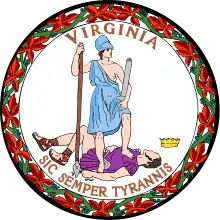Mark Warner
Mark Robert Warner (born December 15, 1954) is an American businessman and politician serving as the senior United States senator from Virginia, first elected in 2008. He is a member of the Democratic Party and currently a vice chair of the Senate Democratic Caucus and the chair of the Senate Intelligence Committee.
Mark Warner | |
|---|---|
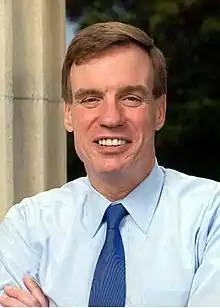 | |
| United States Senator from Virginia | |
| Assumed office January 3, 2009 | |
| Preceded by | John Warner |
| Vice Chair of the Senate Democratic Caucus | |
| Assumed office January 3, 2017 | |
| Leader | Chuck Schumer |
| Preceded by | Chuck Schumer |
| Chair of the Senate Intelligence Committee | |
| Assumed office February 3, 2021 | |
| Preceded by | Marco Rubio (acting) |
| Vice Chair of the Senate Intelligence Committee | |
| In office January 3, 2017 – February 3, 2021 | |
| Preceded by | Dianne Feinstein |
| Succeeded by | Marco Rubio |
| 69th Governor of Virginia | |
| In office January 12, 2002 – January 14, 2006 | |
| Lieutenant | Tim Kaine |
| Preceded by | Jim Gilmore |
| Succeeded by | Tim Kaine |
| Chair of the National Governors Association | |
| In office July 20, 2004 – July 18, 2005 | |
| Preceded by | Dirk Kempthorne |
| Succeeded by | Mike Huckabee |
| Chair of the Virginia Democratic Party | |
| In office May 4, 1993 – September 18, 1995 | |
| Preceded by | Paul Goldman |
| Succeeded by | Suzie Wrenn |
| Personal details | |
| Born | Mark Robert Warner December 15, 1954 Indianapolis, Indiana, U.S. |
| Political party | Democratic |
| Spouse(s) | Lisa Collis (m. 1989) |
| Children | 3 |
| Residence | Alexandria, Virginia, U.S. |
| Alma mater | George Washington University (BA) Harvard University (JD) |
| Net worth | US$200 million |
| Signature | |
| Website | Senate website |
Prior to his Senate career, Warner was the 69th governor of Virginia, holding the office from 2002 to 2006, and is the honorary chairman of the Forward Together PAC. Warner delivered the keynote address at the 2008 Democratic National Convention. Apart from politics, Warner is also known for his involvement in telecommunications-related venture capital during the 1980s; he founded the firm Columbia Capital.
In 2006, he was widely expected to pursue the Democratic nomination in the 2008 U.S. presidential election; however, he announced in October 2006 that he would not run, citing a desire not to disrupt his family life. Warner was considered to be a potential vice presidential candidate, until he took himself out of consideration after winning the Democratic nomination for the U.S. Senate.[1]
Running against his gubernatorial predecessor, Jim Gilmore, Warner won his first election to the Senate in 2008 with 65% of the vote. Warner won reelection in 2014, narrowly defeating Ed Gillespie.[2] He won reelection to a third term in 2020, defeating Republican challenger Daniel Gade.
Early life, education, and business career
Warner was born in Indianapolis, Indiana, the son of Marjorie (née Johnston) and Robert F. Warner. He has a younger sister, Lisa. He grew up in Illinois, and later in Vernon, Connecticut, where he graduated from Rockville High School, a public secondary school. He has credited his interest in politics to his eighth grade social studies teacher, Jim Tyler, who "inspired him to work for social and political change during the tumultuous year of 1968."[3] He was class president for three years at Rockville High School and hosted a weekly pick-up basketball game at his house, "a tradition that continues today."[3]
Warner graduated from George Washington University (GWU), earning his Bachelor of Arts in political science in 1977 and graduating with a perfect 4.0 GPA and was inducted into Phi Beta Kappa. He was valedictorian of his class at GWU and the first in his family to graduate from college.[3] GWU later initiated Warner into Omicron Delta Kappa, the National Leadership Honor Society, as an alumni member in 1995. While at GWU, he worked on Capitol Hill to pay for his tuition, riding his bike early mornings to the office of U.S. Senator Abraham Ribicoff (D-CT).[3] His sophomore year, Warner took time off from school to serve as the youth coordinator on Ella Grasso’s successful gubernatorial bid in Connecticut. [4] Upon returning to Washington, Warner took a part-time job in the office of then-Representative Chris Dodd. He would go on to serve as Dodd’s senatorial campaign manager during his freshman year of law school. [5] When his parents visited him at college, he got two tickets for them to tour the White House; when his father asked him why he didn't get a ticket for himself, he replied, "I'll see the White House when I'm president."[3]
Warner then graduated from Harvard Law School with a Juris Doctor in 1980 and coached the law school's first intramural women's basketball team. Warner then took a job raising money for the Democratic Party based in Atlanta from 1980 to 1982. [6] Warner has never practiced law.[3]
Warner attempted to found two unsuccessful businesses before becoming a general contractor for cellular businesses and investors. As founder and managing director of Columbia Capital, a venture capital firm, he helped found or was an early investor in a number of technology companies, including Nextel. He co-founded Capital Cellular Corporation, and built up an estimated net worth of more than $200 million.[7][8] As of 2012, he was the wealthiest U.S. Senator.[9]
State activism
Warner involved himself in public efforts related to health care, transportation, telecommunications, information technology and education. He managed Douglas Wilder's successful 1989 gubernatorial campaign and served as chairman of the state Democratic Party from 1993-95. Warner also served, in the early 1990s, on the Virginia Commonwealth Transportation Board and sat in on monthly committee meetings of the Rail and Public Transportation Division (headed by Robert G. Corder).
1996 U.S. Senate election
He unsuccessfully ran for the U.S. Senate in 1996 against incumbent Republican John Warner (no relation) in a "Warner versus Warner" election. Mark Warner performed strongly in the state's rural areas, making the contest much closer than many pundits expected.[10] He lost to the incumbent, 52%-47%, losing most parts of the state including the north.[11]
Governor of Virginia
2001 election

In 2001 Warner campaigned for governor as a moderate Democrat after years of slowly building up a power base in rural Virginia, particularly Southwest Virginia. His opponents were Republican Mark Earley, the state's attorney general, and the Libertarian candidate William B. Redpath. Warner won with 52.16 percent of the votes, 96,943 votes ahead of the next opponent.[12] Warner had a significant funding advantage, spending $20 million compared with Earley's $10 million.[13]
Warner also benefited from dissension in Republican ranks after a heated battle for the nomination between Earley, backed by religious conservatives, and then-lieutenant governor John H. Hager, some of whose supporters later openly backed Warner. In the same election, Republican Jerry Kilgore was elected attorney general, and Democrat Tim Kaine was elected lieutenant governor. In his campaign for governor in 2001, Warner said that he would not raise taxes.
Tenure
After he was elected in 2002, Warner drew upon a $900 million "rainy day fund" left by his predecessor, James S. Gilmore, III.[14] Warner campaigned in favor of two regional sales tax increases (Northern Virginia and Hampton Roads) to fund transportation. Virginians rejected both regional referendums to raise the sales tax.
In 2004, Warner worked with Democratic and moderate Republican legislators and the business community to reform the tax code, lowering food and some income taxes while increasing the sales and cigarette taxes. His tax package effected a net tax increase of approximately $1.5 billion annually. Warner credited the additional revenues with saving the state's AAA bond rating, held at the time by only five other states, and allowing the single largest investment in K-12 education in Virginia history. Warner also entered into an agreement with Democrats and moderate Republicans in the Virginia Senate to cap state car tax reimbursements to local governments.
During his tenure as governor, Warner influenced the world of college athletics. "Warner used his power as Virginia's governor in 2003 to pressure the Atlantic Coast Conference into revoking an invitation it had already extended to Syracuse University. Warner wanted the conference, which already included the University of Virginia, to add Virginia Tech instead — and he got his way."[15]

Warner's popularity may have helped Democrats gain seats in the Virginia House of Delegates in 2003 and again in 2005, reducing the majorities built up by Republicans in the 1990s. Warner chaired the National Governors Association in 2004-05 and led a national high school reform movement. He chaired the Southern Governors' Association and was a member of the Democratic Governors Association. In January 2005, a two-year study,[16] the Government Performance Project, in conjunction with Governing magazine and the Pew Charitable Trust graded each state in four management categories: money, people, infrastructure and information. Virginia and Utah received the highest ratings average with both states receiving an A- rating overall, prompting Warner to dub Virginia "the best managed state in the nation."

Kaine and Kilgore both sought to succeed Warner as governor of Virginia. (The Virginia Constitution forbids any governor from serving consecutive terms; so Warner could not have run for a second term in 2005.) On November 8, 2005, Kaine, the former mayor of Richmond, won with 52% of the vote. Kilgore, who had resigned as attorney general in February 2005 to campaign full-time and who had previously served as Virginia secretary of public safety, received 46% of the vote. Russ Potts, a Republican state senator, also ran for governor as an independent, receiving 2% of the vote. Warner had supported and campaigned for Kaine, and many national pundits considered Kaine's victory to be further evidence of Warner's political clout in Virginia.
On November 29, 2005, Warner commuted the death sentence of Robin Lovitt to life imprisonment without the possibility of parole. Lovitt was convicted of murdering Clayton Dicks at an Arlington pool hall in 1999. After his trial in 2001, Lovitt's lawyers stated that a court clerk illegally destroyed evidence that was used against Lovitt during his trial, but that could have possibly exonerated him upon further DNA testing.[17] Lovitt's death sentence would have been the 1,000th carried out in the United States since the Supreme Court reinstated capital punishment as permissible under the Eighth Amendment to the Constitution in 1976. In a statement, Warner said, "The actions of an agent of the commonwealth, in a manner contrary to the express direction of the law, comes at the expense of a defendant facing society's most severe and final sanction." Warner denied clemency in 11 other death penalty cases that came before him as governor.[18]
Warner also arranged for DNA tests of evidence left from the case of Roger Keith Coleman, who was put to death by the state in 1992. Coleman was convicted in the 1981 rape and stabbing death of his 19-year-old sister-in-law, Wanda McCoy. Coleman drew national attention, even making the cover of Time, by repeatedly claiming innocence and protesting the unfairness of the death penalty. DNA results announced on January 12, 2006 confirmed Coleman's guilt.[19]
In July 2005, his approval ratings were at 74%[20] and in some polls reached 80%.[21] Warner left office with a 71% approval rating in one poll.[22]
U.S. Senate
Elections
- 2008
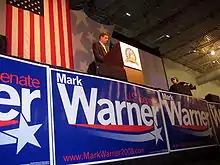
Warner was believed to be preparing to run for the Democratic nomination for president in 2008, and had "done everything but announce his candidacy" before suddenly stating in October 2006 he would not run for president, citing family reasons.[23] Warner declared on September 13, 2007 that he would run for the U.S. Senate seat being vacated by the retiring John Warner (no relation) in 2008.
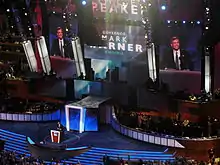
Warner immediately gained the endorsement of most national Democrats. He held a wide lead over his Republican opponent, fellow former Virginia governor Jim Gilmore (and Warner's predecessor), for virtually the entire campaign.[24] Warner delivered the keynote address at the 2008 Democratic National Convention.[25]
In a Washington Post/ABC News Poll dated September 24, 2008, Warner held a 30-point lead over Gilmore.[26]
In the November election, Warner defeated Gilmore, taking 65 percent of the vote to Gilmore's 34 percent. Warner carried all but four counties in the state—Rockingham, Augusta, Powhatan and Hanover. In many cases, he ran up huge margins in areas of the state that have traditionally voted Republican.[27] This was the most lopsided margin for a contested Senate race in Virginia since Chuck Robb took 72 percent of the vote in 1988. As a result of Warner's victory, Virginia had two Democratic U.S. Senators for the first time since Harry Byrd, Jr. left the Democrats to become an independent (while still caucusing with the Democrats) in 1970.
- 2014
In 2014, Warner faced Ed Gillespie, who had previously served as Counselor to the President under George W. Bush and chairman of the Republican National Committee. Warner's margin of victory—only 17,000 votes—was much narrower than expected.[28]
- 2020
In 2020, Warner faced college professor and U.S. Army veteran Daniel Gade.[29] During the general election, he defeated Gade, taking 55 percent of the vote to Gade's 43 percent.[30]
Tenure
Upon arriving in the U.S. Senate in 2009, Warner was appointed to the Senate's Banking, Budget, and Commerce committees. Warner was later named to the Senate Intelligence Committee in 2011.[31]
In 2009, Warner voted for the American Recovery and Reinvestment Act, the stimulus bill. As a member of the Budget Committee, he submitted an amendment designed to help the government track how the stimulus dollars were being spent.[32]
When offered the chair of the Democratic Senatorial Campaign Committee in preparation for the 2012 election cycle, Warner declined because he wanted to keep a distance from the partisanship of the role.[33]
In the fall of 2012, Warner was approached by supporters about possibly leaving the Senate to seek a second four-year term as Virginia's governor. After considering the prospect, Warner announced shortly after the November 2012 elections that he had chosen to remain in the Senate because he was "all in" on finding a bipartisan solution to the country's fiscal challenges.[34]

Warner became the senior senator on January 3, 2013 when Jim Webb left the Senate and was replaced by Tim Kaine, who was lieutenant governor while Warner was governor.
Warner has been identified as a radical centrist,[35] working to foster compromise in the Senate.[36] Warner was ranked the 10th most bipartisan member of the U.S. Senate during the 114th United States Congress in the Bipartisan Index, created by The Lugar Center and the McCourt School of Public Policy to assess congressional bipartisanship.[37] According to the same methodology, Senator Warner was the second most bipartisan Democrat in the 115th United States Congress.
Abortion
Warner is pro abortion rights and supports Roe v. Wade. He also supports some restrictions on abortion such as a ban on partial birth abortion and a 24-hour waiting period.[38]
Health care
_meets_with_constituents.jpg.webp)
On a video in his senate office, Warner promised Virginians, “I would not vote for a health-care plan that doesn't let you keep health insurance you like.” [39]
He voted for the 2010 Affordable Care Act (ACA, commonly called Obamacare), helping the Senate reach the required sixty votes to prevent it from going to a filibuster. (As there were exactly 60 Democratic Senators at the time, each Democrat can be said to have cast the deciding vote.)[40] He and 11 Senate freshmen discussed adding an amendment package aimed at addressing health care costs by expanding health IT and wellness prevention.[41]
In January 2019, Warner was one of six Democratic senators to introduce the American Miners Act of 2019, a bill that would amend the Surface Mining Control and Reclamation Act of 1977 to swap funds in excess of the amounts needed to meet existing obligations under the Abandoned Mine Land fund to the 1974 Pension Plan as part of an effort to prevent its insolvency as a result of coal company bankruptcies and the 2008 financial crisis. It also increased the Black Lung Disability Trust Fund tax and ensured that miners affected by the 2018 coal company bankruptcies would not lose their health care.[42]
In September 2019, amid discussions to prevent a government shutdown, Warner was one of six Democratic senators to sign a letter to congressional leadership advocating for the passage of legislation that would permanently fund health care and pension benefits for retired coal miners as "families in Virginia, West Virginia, Wyoming, Alabama, Colorado, North Dakota and New Mexico" would start to receive notifications of health care termination by the end of the following month.[43]
Finance
From the start of his Senate term, Warner attempted to replicate in Washington, D.C. the bipartisan partnerships that he used effectively during his tenure as Virginia governor. In 2010, Warner worked with a Republican colleague on the Banking Committee, Sen. Bob Corker (R-TN), to write a key portion of the Dodd-Frank Act that seeks to end taxpayer bailouts of failing Wall Street financial firms by requiring “advance funeral plans” for large financial firms.[44]
In 2013, the Center for the Study of the Presidency and Congress gave Sens. Warner and Corker its Publius Award for their bipartisan work on financial reform legislation.[45]
In 2018, Warner became one of the few Democrats in the Senate supporting a bill that would relax “key banking regulations”. As part of at least 11 other Democrats, Warner argued that the bill would “right-size post-crisis rules imposed on small and regional lenders and help make it easier for them to provide credit”. Chuck Schumer and Elizabeth Warren have stated their opposition to the legislation.[46]
Campaign finance
In June 2019, Warner and Amy Klobuchar introduced the Preventing Adversaries Internationally from Disbursing Advertising Dollars (PAID AD) Act, a bill that would modify U.S. federal campaign finance laws to outlaw the purchasing of ads that name a political candidate and appear on platforms by foreign nationals in the midst of an election year.[47]
Defense
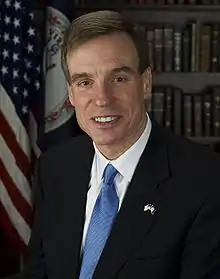
In 2011, Warner voted for the four-year extension of the USA PATRIOT Act. In 2011, he engaged Northern Virginia's high-tech community in a pro-bono effort to correct burial mistakes and other U.S. Army management deficiencies at Arlington National Cemetery.[48] In 2012, he successfully pushed the Navy to improve the substandard military housing in Hampton Roads.[49]
Also in 2012, he pushed the Office of Personnel Management to address chronic backlogs in processing retirement benefits for federal workers, many of whom live in Washington's northern Virginia suburbs.[50] Warner was successful in pushing the Department of Veterans Affairs to expand access to PTSD treatment for female military veterans returning from service in Iraq and Afghanistan.[51]
In August 2013, Warner was one of twenty-three Democratic senators to sign a letter to the Defense Department warning of some payday lenders "offering predatory loan products to service members at exorbitant triple digit effective interest rates and loan products that do not include the additional protections envisioned by the law" and asserting that service members along with their families "deserve the strongest possible protections and swift action to ensure that all forms of credit offered to members of our armed forces are safe and sound."[52]
Warner was awarded the Distinguished Public Service Medal by U.S. Secretary of the Navy Ray Mabus, the Navy's highest honor for a civilian, for his consistent support of Virginia's military families and veterans.[53]
Economy
Between 2010 and 2013, Warner invested considerable time and effort in leading the Senate's Gang of Six, along with Sen. Saxby Chambliss (R-GA).[54] Together, Chambliss and Warner sought to craft a bipartisan plan along the lines of the Simpson-Bowles Commission to address U.S. deficits and debt.[55]
Although the Gang of Six ultimately failed to produce a legislative “grand bargain”, they did agree on the broad outlines of a plan that included spending cuts, tax reforms that produced more revenue, and reforms to entitlement programs like Medicare and Social Security—entitlement reforms that are opposed by most Democrats.[56] Although President Obama showed interest in the plan, leaders in Congress from both parties kept a deal from being made.[57] In 2011, the bipartisan Concord Coalition awarded Warner and Chambliss its Economic Patriots Award for their work with the Gang of Six.[58]
Gun laws
On April 17, 2013, Warner voted to expand background checks for gun purchases as part of the Manchin-Toomey Amendment.[59][60]
In 2017, he called himself a strong supporter of second amendment rights and vowed to advocate for responsible gun ownership for hunting, recreation, and self-defense.[61]
In January 2019, Warner was one of forty senators to introduce the Background Check Expansion Act, a bill that would require background checks for either the sale or transfer of all firearms including all unlicensed sellers. Exceptions to the bill's background check requirement included transfers between members of law enforcement, loaning firearms for either hunting or sporting events on a temporary basis, providing firearms as gifts to members of one's immediate family, firearms being transferred as part of an inheritance, or giving a firearm to another person temporarily for immediate self-defense.[62]
LGBT issues
Warner supports same-sex marriage, announcing his support for same-sex marriage in a statement on his Facebook page in March 2013. His announcement came shortly after Senator Claire McCaskill from Missouri announced her support for the institution.[63] In July 2015, Warner and his Senate counterpart Tim Kaine cosponsored the Equality Act along with 38 other Senators and 158 members of the House of Representatives, with Kaine stating "it's critical that we prohibit discrimination in housing, education and the workplace."[64]
Transparency
On the Senate Budget Committee, Warner was appointed chairman of a bipartisan task force on government performance in 2009.[65] Warner was a lead sponsor of the 2010 Government Performance and Results Act (GPRA), which imposed specific program performance goals across all federal agencies and set up a more transparent agency performance review process.[66]
On May 21, 2013, Warner introduced the Digital Accountability and Transparency Act of 2014 (S. 994; 113th Congress), DATA. “The legislation requires standardized reporting of federal spending to be posted to a single website, allowing citizens to track spending in their communities and agencies to more easily identify improper payments, waste and fraud.”[67][68] On November 6, 2013, the Senate Homeland Security and Government Affairs committee unanimously passed DATA.[69]
On January 27, 2014, a version of the White House Office of Management and Budget's (OMB) marked up version of the bill was leaked. This White House version “move[s] away from standards and toward open data structures to publish information” and “requir[es] OMB in consultation with Treasury to review and, if necessary, revise standards to ensure accuracy and consistency through methods such as establishing linkages between data in agency financial systems...”[70] Senator Warner's responded with the following statement: “The Obama administration talks a lot about transparency, but these comments reflect a clear attempt to gut the DATA Act. DATA reflects years of bipartisan, bicameral work, and to propose substantial, unproductive changes this late in the game is unacceptable. We look forward to passing the DATA Act, which had near universal support in its House passage and passed unanimously out of its Senate committee. I will not back down from a bill that holds the government accountable and provides taxpayers the transparency they deserve.”[71][72]
On April 10, 2014, the Senate voted by unanimous consent to pass the bill, which was then passed by the House in a voice vote on April 28, 2014.[73]
Minimum wage
In April 2014, the United States Senate debated the Minimum Wage Fairness Act (S. 1737; 113th Congress). The bill would amend the Fair Labor Standards Act of 1938 (FLSA) to increase the federal minimum wage for employees to $10.10 per hour over the course of a two-year period.[74] The bill was strongly supported by President Barack Obama and many Democratic Senators, but strongly opposed by Republicans in the Senate and House.[75][76][77] Warner expressed a willingness to negotiate with Republicans about some of the provisions of the bill, such as the timeline for the phase-in.[76] Warner said that any increase needs to be done “in a responsible way.”[78]
Other issues
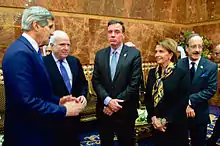
_Mark_Warner_speaks_at_the_September_2020_Hospitality_Roundtable.jpg.webp)
Warner was the original Democratic sponsor of the Startup Act legislation and has partnered with the bill's original author Sen. Jerry Moran (R-KS) to introduce three iterations of the bill: Startup Act in 2011, Startup Act 2.0 in 2012 and Startup Act 3.0 in early 2013. Warner describes the legislation as the 'logical next step' following enactment of the bipartisan JOBS Act.[79]
In 2015, Warner criticized the Saudi Arabian-led intervention in Yemen, saying: “I'm concerned in particular with some of the indiscriminate bombing in Yemen ... [Gulf states] need to step up and they need to step up with more focus than the kind of indiscriminate bombing.”[80]
In September 2016, in advance of a UN Security Council resolution 2334 condemning Israeli settlements in the occupied Palestinian territories, Warner signed an AIPAC-sponsored letter urging President Obama to veto "one-sided" resolutions against Israel.[81]
In June 2017, Warner voted to support Trump's $350 billion arms deal with Saudi Arabia.[82]
In July 2017, Warner voted in favor of the Countering America's Adversaries Through Sanctions Act that grouped together sanctions against Iran, Russia and North Korea.[83]
In December 2017, Warner criticized Donald Trump's decision to recognize Jerusalem as the capital of Israel, saying that it "comes at the wrong time and unnecessarily inflames the region."[84]
In May 2018, Warner voted for Gina Haspel to be the next CIA director.[85]
In 2016, American foreign policy scholar Stefan Halper served as an FBI operative and contacted members of the 2016 Donald Trump Presidential campaign.[85][86][87] In May 2018, Warner, the top Democrat on the Senate Intelligence Committee, warned Republican lawmakers that it would be “potentially illegal” to reveal the identity of Stefan Halper.[88]
In December 2018, Warner called Chinese telecommunications giant Huawei a threat to U.S. national security.[89]
In February 2019, Warner was one of eleven senators to sign a letter to Energy Secretary Rick Perry and Homeland Security Secretary Kirstjen Nielsen urging them "to work with all federal, state and local regulators, as well as the hundreds of independent power producers and electricity distributors nation-wide to ensure our systems are protected" and affirming that they were "ready and willing to provide any assistance you need to secure our critical electricity infrastructure."[90]
In April 2019, Warner was one of thirty-four senators to sign a letter to President Trump encouraging him "to listen to members of your own Administration and reverse a decision that will damage our national security and aggravate conditions inside Central America", asserting that Trump had "consistently expressed a flawed understanding of U.S. foreign assistance" since becoming president and that he was "personally undermining efforts to promote U.S. national security and economic prosperity" through preventing the use of Fiscal Year 2018 national security funding. The senators argued that foreign assistance to Central American countries created less migration to the U.S., citing the funding's helping to improve conditions in those countries.[91]
Warner welcomed the arrest of WikiLeaks founder Julian Assange, who had exposed American war crimes in Iraq and Afghanistan, saying that Julian Assange is "a dedicated accomplice in efforts to undermine American security."[92]
In July 2019, Warner was a cosponsor of the Defending America’s 5G Future Act, a bill that would prevent Huawei from being removed from the "entity list" of the Commerce Department without an act of Congress and authorize Congress to block administration waivers for U.S. companies to do business with Huawei. The bill would also codify President Trump’s executive order from the previous May that empowered his administration to block foreign tech companies deemed a national security threat from conducting business in the United States.[93]
On May 13, 2020, Senator Warner, along with Senator Joe Manchin, was one of the two Democratic senators who voted against Lee-Leahy FISA amendment which strengthened oversight of counterintelligence.[94]
Controversies
In October 2014, Warner was implicated in a federal investigation of the 2014 resignation of Virginia State Senator Phillip Puckett, a Democrat. He is alleged to have “discussed the possibility of several jobs, including a federal judgeship, for the senator's daughter in an effort to dissuade him from quitting the evenly divided state Senate.” [95] A Warner spokesman acknowledged that the conversation occurred, but said Warner made no “explicit” job offer[96] and that he and Puckett were simply "brainstorming".[97]
In January 2015, the Republican Party of Virginia filed a formal complaint against Warner with the United States Senate Select Committee on Ethics, alleging Warner's interactions with Puckett violated the Honest Leadership and Open Government Act.[98]
Campaign contributions
From 2008-14, some of his top ten campaign contributors were JP Morgan Chase, the Blackstone Group and Columbia Capital.[99] BlackRock had never contributed until Warner bought shares in the BlackRock Equity Dividend Fund in 2011.[99]
Committee assignments
- Committee on Banking, Housing, and Urban Affairs
- Subcommittee on Housing, Transportation, and Community Development
- Subcommittee on Security and International Trade and Finance
- Subcommittee on Securities, Insurance, and Investment (Ranking Member)
- Committee on the Budget
- Committee on Finance
- Committee on Rules and Administration
- Select Committee on Intelligence (Ranking Member)
- Joint Economic Committee
Electoral history
| Party | Candidate | Votes | % | ±% | |
|---|---|---|---|---|---|
| Republican | John Warner (Incumbent) | 1,235,744 | 52.48% | -28.43% | |
| Democratic | Mark Warner | 1,115,982 | 47.39% | ||
| Write-ins | 2,989 | 0.13% | |||
| Majority | 119,762 | 5.09% | -57.67% | ||
| Turnout | 2,354,715 | ||||
| Republican hold | Swing | ||||
| Party | Candidate | Votes | % | ±% | |
|---|---|---|---|---|---|
| Democratic | Mark Warner | 984,177 | 52.16% | +9.60% | |
| Republican | Mark Earley | 887,234 | 47.03% | -8.79% | |
| Libertarian | Bill Redpath | 14,497 | 0.77% | ||
| Write-ins | 813 | 0.04% | |||
| Majority | 96,943 | 5.14% | -8.11% | ||
| Turnout | 1,886,721 | ||||
| Democratic gain from Republican | Swing | ||||
| Party | Candidate | Votes | % | ±% | |
|---|---|---|---|---|---|
| Democratic | Mark Warner | 2,369,327 | 65.03% | +65.03% | |
| Republican | Jim Gilmore | 1,228,830 | 33.72% | -48.85% | |
| Independent Greens | Glenda Parker | 21,690 | 0.60% | ||
| Libertarian | Bill Redpath | 20,269 | 0.56% | ||
| Write-ins | 3,178 | 0.09% | |||
| Majority | 1,140,497 | 31.30% | -41.53% | ||
| Turnout | 3,643,294 | ||||
| Democratic gain from Republican | Swing | ||||
| Party | Candidate | Votes | % | ±% | |
|---|---|---|---|---|---|
| Democratic | Mark Warner (Incumbent) | 1,073,667 | 49.15% | -15.88% | |
| Republican | Ed Gillespie | 1,055,940 | 48.34% | +14.62% | |
| Libertarian | Robert Sarvis | 53,102 | 2.43% | +1.87% | |
| Other | Write-ins | 1,764 | 0.08% | -0.01% | |
| Plurality | 17,727 | 0.81% | -30.49% | ||
| Turnout | 2,184,473 | ||||
| Democratic hold | Swing | ||||
| Party | Candidate | Votes | % | ±% | |
|---|---|---|---|---|---|
| Democratic | Mark Warner (Incumbent) | 2,466,500 | 55.99% | +6.84% | |
| Republican | Daniel Gade | 1,934,199 | 43.91% | -4.43% | |
| Other | Write-ins | 4,388 | 0.10% | +0.02% | |
| Majority | 532,301 | 12.08% | +11.27% | ||
| Turnout | 4,405,087 | ||||
| Democratic hold | Swing | ||||
Personal life
Warner is married to Lisa Collis.[3] While on their honeymoon in 1989 in Egypt and Greece, Warner became ill; when he returned home, doctors discovered he had suffered a near-fatal burst appendix. Warner spent two months in the hospital recovering from the illness.[3] During her husband's tenure as governor, Collis was the first Virginia first lady to use her birth name. Warner and Collis have three daughters: Madison, Gillian, and Eliza.
Warner is involved in farming and winemaking at his Rappahannock Bend farm. There, he grows 15 acres (61,000 m2) of grapes for Ingleside Vineyards; Ingleside bottles a private label that Warner offers at charity auctions.[105]
Warner has an estimated net worth of $257 million as of 2014.[106]
Mark Warner is not related to John Warner, his predecessor in the Senate.
Honorary degrees
Mark Warner has been awarded several honorary degrees, these include:
- Honorary degrees
| Location | Date | School | Degree |
|---|---|---|---|
| 2002 | College of William and Mary | Doctor of Laws (LL.D) [107] | |
| 2003 | George Washington University | Doctor of Public Service (DPS) [108] | |
| May 15, 2006 | Wake Forest University | Doctor of Laws (LL.D) [109] | |
| 2007 | Lord Fairfax Community College | Associate of Humane Letters | |
| May 20, 2007 | Eastern Virginia Medical School | Doctorate [110] | |
| May 25, 2013 | George Mason University | Doctorate [111] | |
| May 19, 2018 | Virginia State University | Doctorate [112] | |
References
- Lewis, Bob (June 14, 2008). "Warner takes self out of VP mix". The San Francisco Chronicle. Associated Press. Archived from the original on June 18, 2008. Retrieved June 15, 2008.
- Vozzella, Laura; Portnoy, Jenna; Weiner, Rachel (November 4, 2019). "Warner claims victory over Gillespie in Virginia Senate race". The Washington Post. Retrieved December 31, 2019.
- Shaffrey, Mary M.; Hook, Carol S. (November 5, 2008). "10 Things You Didn't Know About Mark Warner". U.S. News & World Report. Retrieved October 10, 2020.
- Fiske, Warren. "Mark Warner - a hard-driver pushing for his goals". pilotonline.com.
- Guldin, Bob. "Virginia's Man of the Moment". GW Magazine. Retrieved October 10, 2020.
- "Q&A Mark Warner". C-Span. October 31, 2005. Retrieved October 10, 2020.
- Evans, Steve (September 7, 2007). "Former Virginia Gov. Mark Warner Advises Darden Students". UVA Today. University of Virginia. Retrieved June 16, 2014.
- Warren, Jay (October 29, 2008). "WSLS profiles Mark Warner". WSLS 10. Archived from the original on June 16, 2014. Retrieved June 16, 2014.
- "Mark Warner (D-Va), 2012". Opensecrets.org. Center for Responsive Politics. Retrieved June 28, 2014.
- Biodata Document Number: K1650003526, Resource Center Online. Gale, 2003; reproduced in Biography Resource Center. Farmington Hills, Mich.: Gale, 2008; retrieved September 25, 2008.
- "Sen. Mark Warner (D-VA) -- The Almanac of American Politics". National Journal. Archived from the original on October 18, 2012. Retrieved December 14, 2012.
- Montanaro, Domenico (October 29, 2013). "Just twice in 50 years has Va. seen dip in turnout for governor's race. Why it could happen again". NBC News. Retrieved February 19, 2019.
- "On-line Campaign Finance Disclosure Reports". Sbe.virginia.gov. Archived from the original on September 26, 2011. Retrieved February 26, 2014.
- "Mark Warner's rising stock". The Roanoke Times. January 1, 2006. Archived from the original on September 13, 2012. Retrieved December 16, 2007.
- Kornacki, Steve (October 27, 2011). "Why all of West Virginia now hates Mitch McConnell". Salon. Archived October 29, 2011, at the Wayback Machine
- "Virginia". Government Performance Project. Governing magazine. 2005. Archived from the original on October 5, 2006. Retrieved October 2, 2006.
- "Governor halts landmark execution". The Michigan Daily. November 30, 2005. Retrieved June 17, 2014.
- "Conservatives Urge Virginia Governor to Grant Clemency Request as 1,000th Execution Nears". deathpenaltyinfo.org. Death Penalty Information Center. November 22, 2005. Retrieved June 17, 2014.
- Glod, Maria; D. Shear, Michael (January 13, 2006). "DNA Tests Confirm Guilt of Executed Man". The Washington Post. Retrieved October 2, 2006.
- Schapiro, Jeff E. (July 26, 2005). "WARNER LEADS HYPOTHETICAL RACE; GOVERNOR COULD BE TOUGH RIVAL TO ALLEN FOR SENATE, POLL FINDS". Richmond Times-Dispatch.
- Rozell, Mark J. (November 9, 2005). "Virginia Gubernatorial Election". The Washington Post. Retrieved May 12, 2010.
- "Poll says Allen leads potential challengers in race for Senate". Goliath Business News. December 9, 2005. Retrieved August 29, 2010.
- Shear, Michael D. (October 17, 2006). "'Family' Reasons? Theories Abound on Warner's Exit". The Washington Post. Retrieved February 26, 2014.
- Sabato, Larry (December 14, 2007). "A Second Democratic Year in '08?". RealClearPolitics. Retrieved December 16, 2007.
- "America needs Obama, says ex-Virginia governor". CNN. August 26, 2008. Retrieved August 28, 2008.
- Craig, Tim; Agiesta, Jennifer (September 24, 2008). "Warner Leads Gilmore By 30 Points, Poll Finds". The Washington Post. p. B01. Retrieved September 24, 2008.
- "Results by county for 2008 Senate election". voterinfo.sbe.virginia.gov. Virginia State Board of Elections. Archived from the original on February 26, 2012. Retrieved February 26, 2014.
- Silver, Nate (November 6, 2014). "Why Polls Missed a Shocker in Virginia's Senate Race". FiveThirtyEight. Retrieved November 7, 2014.
- Solano, Sophia (December 12, 2019). "SPA professor and veteran running for Virginia U.S. Senate seat". The Eagle. Retrieved December 24, 2020.
- "2020 November General Official Results". Virginia Department of Elections. Retrieved December 24, 2020.
- "U.S. Senate Select Committee on Intelligence". intelligence.senate.gov. February 4, 1997. Retrieved February 26, 2014.
- "Greater accountability for stimulus spending". warner.senate.gov. Office of Senator Mark Warner. March 10, 2010. Retrieved November 17, 2016.
- "Sen. Mark Warner (D)". National Journal Almanac. Retrieved August 15, 2014.
- Pershing, Ben (February 25, 2011). "Mark Warner won't run for Virginia governor, will stay in Senate". The Washington Post. Retrieved February 26, 2014.
- Avlon, John P. (October 16, 2008). "The stand-out centrists of 2008". Politico. Retrieved May 1, 2018.
- Weiner, Rachel (November 23, 2014). "On Capitol Hill, Sen. Mark Warner has quite the spring in his step". The Washington Post. Retrieved May 1, 2018.
- The Lugar Center - McCourt School Bipartisan Index (PDF), The Lugar Center, March 7, 2016, retrieved April 30, 2017
- "Mark Warner on Abortion". OnTheIssues. October 23, 2020. Retrieved December 29, 2020.
- Pershing, Ben (November 30, 2013). "If not Cuccinelli, then who? GOP field against Mark Warner in 2014 still a work in progress". The Washington Post. Washington, D.C. Retrieved June 17, 2014.
- Gorman, Sean (November 29, 2013). "PolitiFact: Cuccinelli mischaracterizes Warner's ACA vote". PolitiFact. Retrieved June 17, 2014.
- Broder, David S. (December 11, 2009). "Freshmen senators offer sensible health care cuts". Houston Chronicle. Retrieved October 11, 2020.
- Holdren, Wendy (January 4, 2019). "Legislation introduced to secure miners pensions and health care". The Register-Herald.
- Thomas, Alex (September 16, 2019). "Manchin, colleagues send letter urging permanent funding for miners health care, pensions". MetroNews. Retrieved October 11, 2020.
- "Dancing Across the Aisle". BusinessWeek. January 21, 2010. Retrieved February 26, 2014.
- "Publius Awards - Center for the Study of the Presidency and Congress". thepresidency.org. Retrieved February 26, 2014.
- Warmbrodt, Zachary (March 5, 2018). "Victory in sight for Democrats defying Warren on bank bill". Politico. Retrieved March 9, 2018.
- Miller, Maggie (June 25, 2019). "Klobuchar, Warner introduce bill to limit foreign involvement in US political ads". The Hill. Retrieved October 11, 2020.
- Davenport, Christian (August 7, 2010). "High-tech companies volunteer to digitize Arlington National Cemetery's records". The Washington Post. Retrieved February 26, 2014.
- Simmons, Laurie (December 14, 2011). "Navy makes big changes after families complain about mold problems". WTKR. Retrieved February 26, 2014.
- Kopp, Emily (February 2, 2012). "Senators take OPM to task over long wait for pensions". Federal News Network. Retrieved February 26, 2014.
- "Sen. releases VA report on female vets". WWLP. January 10, 2011. Archived July 29, 2013, at the Wayback Machine
- Cox, Ramsey (August 15, 2013). "Senate Dems ask DOD to protect service members from predatory lenders". The Hill. Retrieved October 11, 2020.
- Connors, Mike (March 14, 2013). "Navy gives Sen. Warner highest civilian honor". The Virginian-Pilot. Retrieved February 26, 2014.
- Shear, Michael D. (December 21, 2010). "Two Senators Seek Middle Ground on Debt". The New York Times. Retrieved October 11, 2020.
- Keller, Bill (April 29, 2011). "What if Sanity Prevails In Washington?". The New York Times. Retrieved February 26, 2014.
- Killian, Linda (December 1, 2010). "Democratic Sen. Mark Warner Defies Party to Engage GOP on a Deficit deal". The Daily Beast. Retrieved February 26, 2014.
- Calmes, Jackie; Steinhauer, Jennifer (July 19, 2011). "Bipartisan Plan for Budget Deal Buoys President". The New York Times. New York, NY. Retrieved June 16, 2014.
- "Concord Coalition honors Sens. Warner & Chambliss". warner.senate.gov. Office of Senator Mark Warner. December 18, 2012. Retrieved February 26, 2014.
- "U.S. Senate Roll Call Votes 113th Congress – 1st Session:On the Amendment (Manchin Amdt. No. 715)". senate.gov. United States Senate. Retrieved July 30, 2013.
- Todd, Chuck; Murray, Mark; Montanaro, Domenico; Brower, Brooke (April 18, 2013). "Why the gun measure went down to defeat". NBC News. Retrieved October 13, 2020.
- "Sen. Warner Statement on Concealed Carry Gun Legislation". warner.senate.gov. Office of Senator Mark Warner. May 3, 2017. Retrieved March 21, 2019.
- "U.S. Senator Tammy Baldwin Helps Introduce Background Check Expansion Act To Reduce Gun Violence". Urban Milwaukee. January 9, 2019. Retrieved October 13, 2020.
- Blake, Aaron (March 25, 2013). "Sen. Mark Warner backs gay marriage". The Washington Post. Retrieved December 28, 2018.
- "Warner, Kaine Introduce Comprehensive LGBT Nondiscrimination Bill". warner.senate.gov. Office of Senator Mark Warner. July 23, 2015. Retrieved December 28, 2018.
- "Performance Task Force - Senate Budget Committee". Budget.senate.gov. July 30, 2013. Archived from the original on February 27, 2014. Retrieved February 26, 2014.
- "Roanoke Times: Blue Ridge Caucus". The Roanoke Times. Retrieved August 9, 2014.
- "S.994 - 113th Congress (2013-2014): Digital Accountability and Transparency Act of 2013". congress.gov. Library of Congress. Retrieved February 7, 2014.
- "Sens. Warner & Portman Introduce Bipartisan DATA Act". warner.senate.gov. Office fo Senator Mark Warner. May 21, 2013. Retrieved October 13, 2020.
- "Senate Committee Unanimously Passes Sen. Warner's Bipartisan DATA Act". warner.senate.gov. Office of Senator Mark Warner. November 6, 2013. Retrieved October 13, 2020.
- Miller, Jason (January 27, 2014). "White House calls for major changes to DATA Act". Federal News Radio. Retrieved February 7, 2014.
- Hollister, Hudson (January 28, 2014). "Sen. Warner Rejects OMB Revisions to DATA Act". datacoalition.org. Data Transparency Coalition. Retrieved October 13, 2020.
- Ferenstein, Gregory (February 4, 2014). "White House Conspicuously Silent As It Attacks A Bill To Make Spending Transparent". TechCrunch. Retrieved February 7, 2014.
- "S. 994 - All Actions". congress.gov. United States Congress. Retrieved April 28, 2014.
- "S. 1737 - Summary". congress.gov. United States Congress. Retrieved April 8, 2014.
- Sink, Justin (April 2, 2014). "Obama: Congress has 'clear choice' on minimum wage". The Hill. Retrieved April 9, 2014.
- Bolton, Alexander (April 8, 2014). "Reid punts on minimum-wage hike". The Hill. Retrieved April 9, 2014.
- Bolton, Alexander (April 4, 2014). "Centrist Republicans cool to minimum wage hike compromise". The Hill. Retrieved April 9, 2014.
- Bolton, Alexander (April 1, 2014). "Reid: Minimum wage vote may slip". The Hill. Retrieved April 9, 2014.
- Hall, Kevin. "Sens. Warner, Moran, Rubio & Coons Introduce Startup Jobs Proposal". warner.senate.gov. Officer of Senator Mark Warner. Retrieved February 26, 2014.
- Fang, Lee (October 1, 2015). "U.S. Senators Hem and Haw on Saudi Arabia's Human Rights Abuses". The Intercept. Retrieved October 13, 2020.
- "Senate - Aipac" (PDF). September 19, 2016.
- Carney, Jordain (June 13, 2017). "Senate rejects effort to block Saudi arms sale". The Hill. Retrieved October 15, 2020.
- "U.S. Senate: U.S. Senate Roll Call Votes 115th Congress - 1st Session: On Passage of the Bill (H.R. 3364)". senate.gov. United States Senate. July 27, 2017. Retrieved October 13, 2020.
- "Who's Speaking Out Against Trump's Jerusalem Move". jstreet.org. J Street. December 12, 2017. Retrieved October 13, 2020.
- Greenwald, Glenn (May 19, 2018). "The FBI Informant Who Monitored the Trump Campaign, Stefan Halper, Oversaw a CIA Spying Operation in the 1980 Presidential Election". The Intercept. Retrieved October 13, 2020.
- Herndon, Toby (May 20, 2018). "Cambridge don Stefan Halper named in Donald Trump spy row". The Times. Retrieved October 13, 2020.
- Porter, Tom (May 20, 2018). "Who is Stefan Halper? U.S. Cambridge Professor Named as FBI's Russia Probe Secret Source". Newsweek. Retrieved October 13, 2020.
- Sanchez, Luis (May 19, 2018). "Schumer: GOP efforts to identify FBI informant 'close to crossing a legal line". The Hill. Retrieved October 13, 2020.
- Russell, Andrew (December 7, 2018). "'Basically kidnapping': China's state media lashes out at Canada over arrest of Huawei executive". Global News. Retrieved October 13, 2020.
- Thomsen, Jacqueline (February 25, 2019). "Key senators say administration should ban Huawei tech in US electric grid". The Hill. Retrieved October 15, 2020.
- Frazin, Rachel (April 4, 2019). "More than 30 Senate Dems ask Trump to reconsider Central American aid cuts". The Hill. Retrieved October 15, 2020.
- "World reacts to arrest of WikiLeaks founder of Julian Assange". The CEO Magazine. April 12, 2019. Retrieved October 15, 2020.
- Miller, Maggie (July 16, 2019). "Lawmakers introduce bill to block U.S. companies from doing business with Huawei". The Hill. Retrieved October 15, 2020.
- "Roll Call Vote 116th Congress - 2nd Session: On the Amendment (Lee Amdt. No. 1584)". senate.gov. Retrieved October 15, 2020.
- Vozzella, Laura (October 10, 2014). "Warner discussed job for Puckett's daughter". The Washington Post. Retrieved October 15, 2020.
- Rubin, Jennifer (October 12, 2014). "Is Sen. Mark Warner in trouble?". The Washington Post. Retrieved October 15, 2020.
- "Today's Top Opinion: Puckettgate implicates both parties". Richmond Times-Dispatch. Retrieved November 11, 2016.
- Republican Party of Virginia letter; accessed November 11, 2016.
- Clozel, Lalita. "Mark Warner and BlackRock: It's Complicated". opensecrets.org. Center for Responsive Politics. Retrieved June 28, 2014.
- "96 PRESIDENTIAL and CONGRESSIONAL ELECTION STATISTICS". Clerk.house.gov. Retrieved August 9, 2014.
- "Official Election Results". sbe.virginia.gov. Archived from the original on December 28, 2012. Retrieved April 18, 2013.
- "2008 Election Statistics". Clerk.house.gov. Retrieved August 9, 2014.
- "November 4, 2014-General-Election Results Official Results". Virginia Department of Elections. Archived from the original on November 7, 2014. Retrieved November 27, 2014.
- "November 2020 General Official Results". Virginia Department of Elections. Retrieved December 11, 2020.
- Bedard, Paul (November 20, 2005). "A Modern-Day Thomas Jefferson?". U.S. News and World Report. Archived from the original on January 21, 2011. Retrieved March 19, 2012.
- "Report: Mark Warner 2nd richest member of Congress". The Virginian-Pilot. January 11, 2014. Retrieved May 1, 2018.
- Zagursky, Erin (May 12, 2018). "'Don't check out': Warner encourages W&M grads to be active citizens". wm.edu. College of William and Mary. Retrieved March 15, 2019.
- "Honorary Degree Recipients". provost.gwu.edu. George Washington University. Retrieved March 15, 2019.
- "2006: Honorary degrees". Commencement News. Retrieved March 15, 2019.
- Brown Garrow, Hattie (May 20, 2007). "Mark Warner tells EVMS grads their degrees are 'tickets' to success". The Virginian-Pilot. Retrieved March 15, 2019.
- "George Mason University Commencement Address". C-SPAN. May 18, 2013. Retrieved March 15, 2019.
- Kidd, Thomas; Hobbs, Leah (May 19, 2018). "Lt. Gov. Justin E. Fairfax and U.S. Sen. Mark R. Warner encourage VSU graduates at dual commencement ceremonies". Richmond Free Press. Retrieved March 15, 2019.
Further reading
- Archival records
- Archived website of the Office of the Virginia Governor
- Archived website of Virginia Governor Mark R. Warner, 2005-2006 part of Virginia's Political Landscape 2005 Web Archive Collection at Virginia Memory
- A Guide to the Governor Mark R. Warner, Executive Office, Records, 2001-2006 at The Library of Virginia
- A Guide to the Records of the Policy Office of Governor Mark R. Warner, 2002-2006 at The Library of Virginia
- A Guide to the Governor Mark R. Warner, Press Office records, 2001-2006 (bulk 2002-2006) at The Library of Virginia
- A Guide to the Governor Mark R. Warner, Transition Office, Records, 2001 at The Library of Virginia
- A Guide to the Governor Mark R. Warner, Virginia Liaison Office, Records, 2002-2005 at The Library of Virginia
External links
| Wikimedia Commons has media related to Mark Warner. |
- Senator Mark Warner official U.S. Senate website
- Mark Warner for Virginia campaign website
- Mark Warner at Curlie
- Appearances on C-SPAN
- Biography at the Biographical Directory of the United States Congress
- Profile at Vote Smart
- Financial information (federal office) at the Federal Election Commission
- Legislation sponsored at the Library of Congress
| Party political offices | ||
|---|---|---|
| Preceded by Paul Goldman |
Chair of the Virginia Democratic Party 1993–1995 |
Succeeded by Suzie Wrenn |
| Vacant Title last held by Edythe Harrison |
Democratic nominee for U.S. Senator from Virginia (Class 2) 1996 |
Vacant Title next held by Himself |
| Preceded by Don Beyer |
Democratic nominee for Governor of Virginia 2001 |
Succeeded by Tim Kaine |
| Preceded by Barack Obama |
Keynote Speaker of the Democratic National Convention 2008 |
Succeeded by Julian Castro |
| Vacant Title last held by Himself |
Democratic nominee for U.S. Senator from Virginia (Class 2) 2008, 2014, 2020 |
Most recent |
| Preceded by Chuck Schumer |
Vice Chair of the Senate Democratic Conference 2017–present Served alongside: Elizabeth Warren |
Incumbent |
| Political offices | ||
| Preceded by Jim Gilmore |
Governor of Virginia 2002–2006 |
Succeeded by Tim Kaine |
| Preceded by Dirk Kempthorne |
Chair of the National Governors Association 2004–2005 |
Succeeded by Mike Huckabee |
| U.S. Senate | ||
| Preceded by John Warner |
U.S. Senator (Class 2) from Virginia 2009–present Served alongside: Jim Webb, Tim Kaine |
Incumbent |
| Preceded by Dianne Feinstein |
Vice Chair of the Senate Intelligence Committee 2017–2021 |
Succeeded by Marco Rubio |
| Preceded by Marco Rubio Acting |
Chair of the Senate Intelligence Committee 2021–present |
Incumbent |
| U.S. order of precedence (ceremonial) | ||
| Preceded by Jeanne Shaheen |
United States Senators by seniority 33rd |
Succeeded by Jim Risch |

